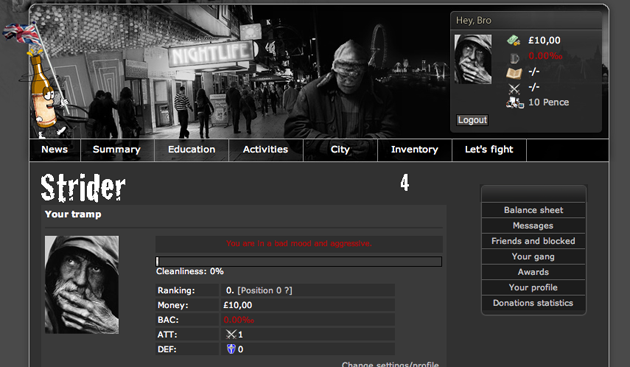Most of our readers have probably never heard of Pennergame, a controversial German game that asks players to rise from virtual homelessness to great wealth, by any means necessary. The text-based game has proven immensely popular in Germany, where it sees 1.8 million unique visitors a month and 1.5 billion page impressions, and is the third fastest growing website according to Comscore (falling just behind Facebook). With subject matter like animal-fights, tramps, and a “blood alcohol level management system”, the game has also raised the ire of a number of activist groups and politicans for its deragotory portrayal of the homeless.
Today the two young men behind the game are launching an English version called Dossergame, which retains the same gameplay as the original with a London-themed slant (the creators may released localized US versions in the future). Once again gamers are asked to “beg, collect junk and to form gangs with other players” in the quest to rise from tramp to “castle owner”. So will Dossergame be able to capture the huge success of the original?

As far as I can tell there isn’t anything particularly unique about Pennergame or its English sibling. Both games are primarily text-based, allowing gamers to rise in power and reputation by boosting their stats and interacting with other players. If that sounds familiar, it’s because games like Mob Wars and iMob are very similar, just with a different set of art and characters. And other text-based games have existed for many years, long before Mob Wars and its ilk.
Pennergame has succeed not because of its technology, but because it became a social phenomenon, allowing kids and co-workers who know each other in real life to band together in virtual gang wars. Dossergame may be able to ride the coattails of its German counterpart to popularity, but it will have to rely primarily on word-of-mouth, which is hard to force.
The small team who built Dossergame and Pennergame are also behind Verwandt.de, a German clone of Geni.
